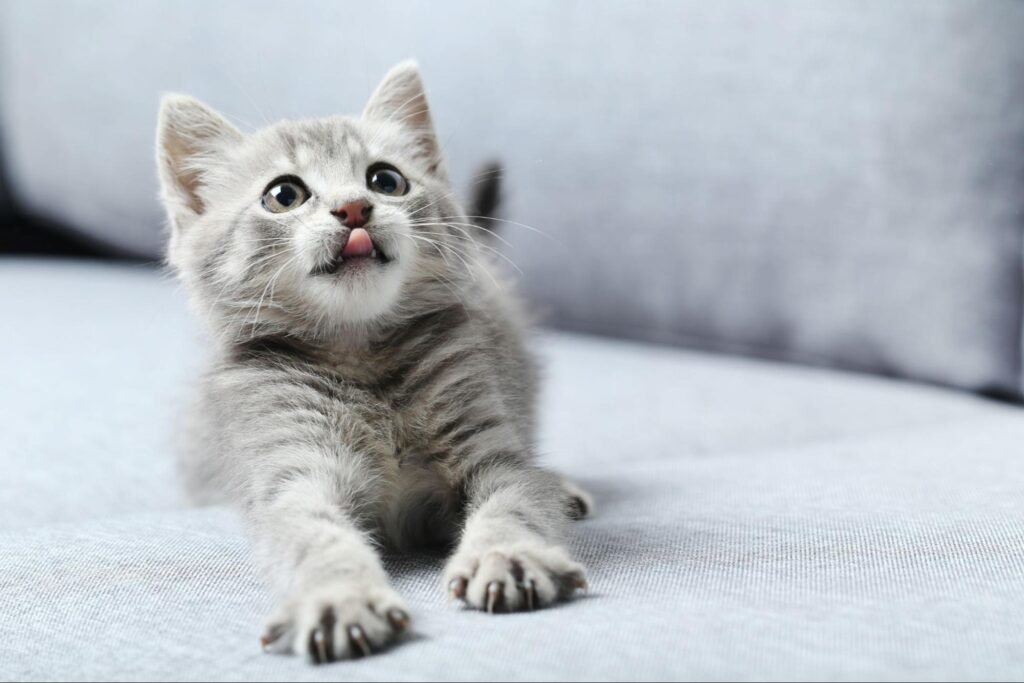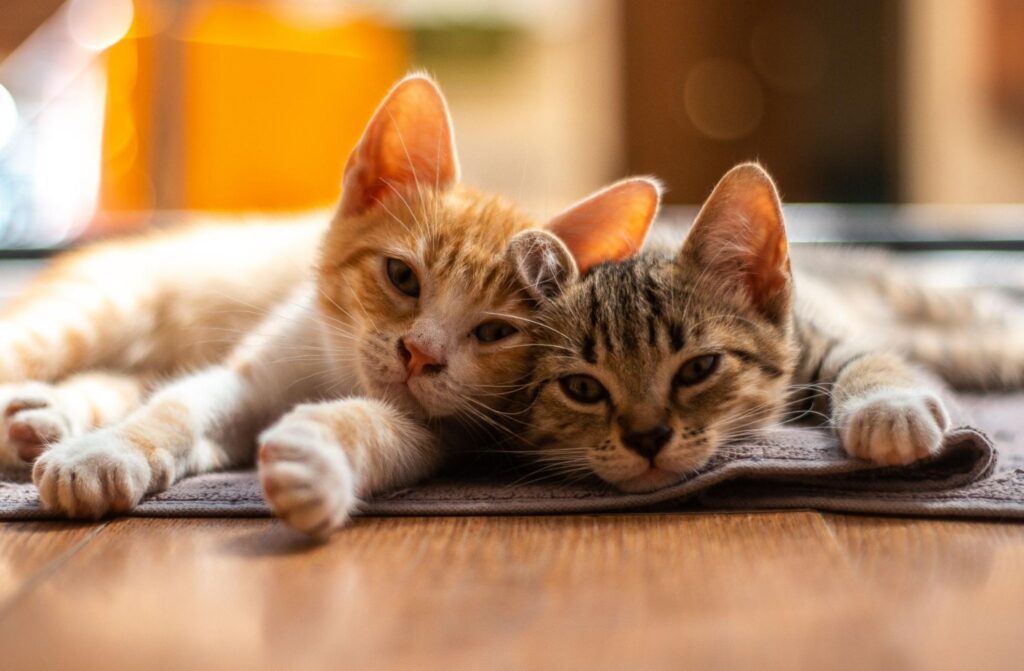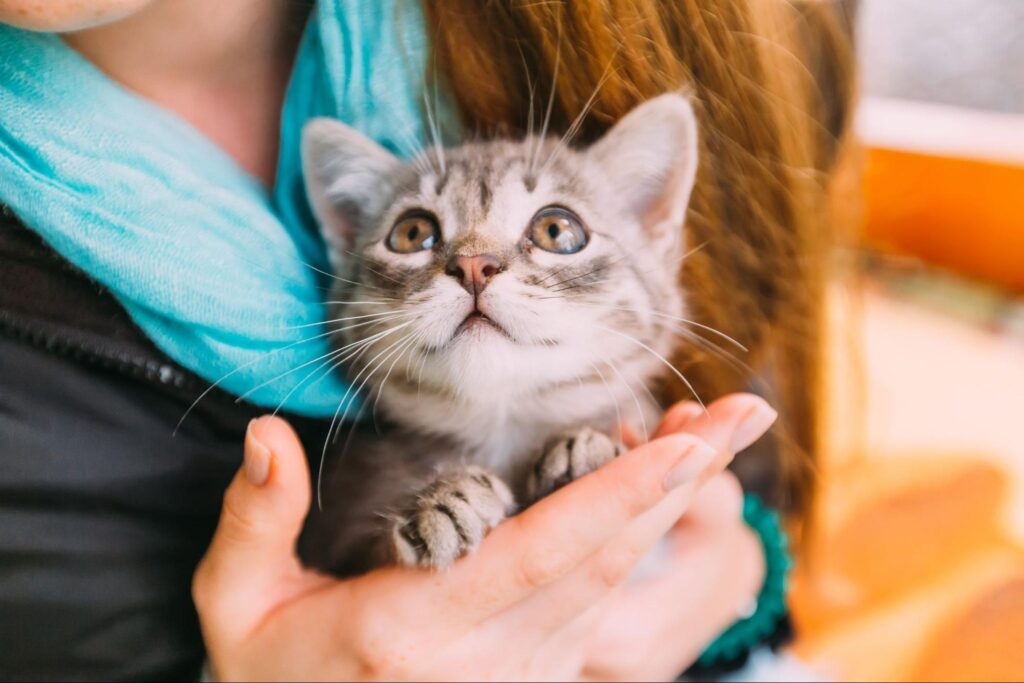A Super Pet Parent’s Guide to Your New Kitten
They’re fuzzy, they’re cuddly, and who can resist those cute little meows? It’s no surprise that kittens are popular and beloved pets all over the world. Picking out and bringing home a new kitten is lots of fun, but it’s also plenty of work. Raising an animal requires attention, commitment, and some know-how.
At Mighty Pet, we like to think of pets’ lives as seasons. The kitten days are like the spring season: your kitten is brand new, full of life, and in bloom as he develops more each day. We put together this helpful guide to help you through this first, exciting season.
What kitten food should I buy?
What should my kitten’s sleep schedule look like?
Litter box training my kitten
Is cat declawing a good idea?
Do kittens need socialization?
Ouch! My kitten is biting. What now?

What kitten food should I buy?
Kittens need special food to support their rapidly growing bodies and brains. Kitten food regulations specify that all kitten foods, regardless of the brand, must contain at least 30% protein and 9% fat.
Wet food is the typical choice for kittens. The extra moisture it provides is great for your growing cat. However, many vets recommend feeding your kitten a mix of wet and dry food, so that he will be a flexible eater as an adult. Dry treats or an occasional handful of kibble mixed in with (or served alongside) his wet food will help him expand his palate.
When it comes to selecting a brand, choose reputable names with good quality control standards. The best way to ensure that your cat is getting nutritious food is to visit your local pet store and work with their knowledgeable staff. Here at Mighty Pet in Menominee, our pet experts help customers sort through the options and find the optimal food for their pets.

What should my kitten’s sleep schedule look like?
Kittens tend to sleep more than older cats (an average of 18 hours a day, compared to 16 hours a day for adult cats). However, they also often have more energy during their waking hours. And since cats tend to be most active at dawn and dusk, you may lose some sleep when you first bring home your kitten. But, don’t worry–with a few simple steps, you can get a handle on that late-night kitten energy.
Giving your kitten plenty of play and independent activities during the day will help him get his zoomies out at a more convenient time. You can also change feeding time to be closer to bedtime, since cats tend to fall asleep after eating. Kittens may also be comforted into sleep by a familiar object. If you adopt a kitten from a shelter or foster, ask if the kitten has a favorite blanket or toy that you can take home with you–they will likely be happy to give it to you.

If nothing else works, you can always shut your kitten out of your bedroom. Make sure he has his own, comfortable sleeping space with access to a cozy cat bed or blanket, water, and the litter box. He may whine to be let into your room at first, but he will eventually adjust.
Do kittens need litter box training?
The good news: most cats require very little, if any, training to learn to use the litter box, because it is a natural instinct for cats to dig and bury their waste. The bad news: a cat can still develop bad habits.
The best way to prevent those bad habits is with a proper litter box setup. Put the litter box in a semi-private area. However, make sure it isn’t in a too-cramped space, or somewhere dark and enclosed where your cat may feel trapped. Use plain, clumping litter. If your cat seems happy with his litter, don’t switch it up. Keep the litter box clean, and make sure it is big enough for your cat to comfortably stand in. If you have multiple cats, ensure that you have at least one litter box for each of them, plus one extra.
For his first couple of days, keep your new kitten close to the litter box, so that he can figure out for himself where it is and how to use it. You can even guide him to it and allow him to give it a sniff. When he uses it correctly, reward him with affection and a treat.

Is cat declawing a good idea?
The American Veterinary Medical Association and the American Humane Society both strongly discourage cat declawing. Some states have even banned the procedure.
The surgery involves amputating the last bone of each of the cat’s toes–imagine losing the last knuckle on all of your fingers! AVMA studies report many negative effects of declawing. Immediately after surgery, cats may experience severe pain, limping, and emotional distress. As time passes, declawed cats are more likely to have trouble using the litter box. They may also become aggressive or withdrawn due to continued emotional distress and confusion.
Scratching can be a pain to humans (literally and figuratively), but it is a natural behavior in cats. There are plenty of ways to prevent scratching that still allow your cat to exercise his instincts, like regularly trimming his claws or using soft nail caps. If your cat scratches when stressed, learn to identify his stressors, and minimize them.
The best way to keep a kitten from shredding your furniture is to provide scratching posts and toys. If your kitten is still scratching the furniture, use plastic sheeting or double-sided tape to steer him away from the couch and towards the scratching post. Reward him with treats and affection when he uses the post.
Do kittens need socialization?
A kitten that has spent time around other humans and animals from birth may acclimate easily into your home. However, some cats, whether they are rescued strays or simply shy by nature, need time to warm up.

The first few weeks you spend with your new kitten are very important: first impressions matter! Provide a comfortable environment with everything he needs. When he seeks affection, give him plenty, but don’t force him to interact if he’s skittish. Treats can be great motivators and rewards, and will help your kitten build positive associations with human contact.
If you have other pets, introduce them slowly. Keep them in separate rooms at first. Feed them at the same time on opposite sides of a closed door. This allows your resident pet to pick up on the newcomer’s scent, and to associate it with something positive (feeding time). Take an object with your new pet’s scent and give it to your resident pet, and vice versa. Once they’ve had time to warm up to each other, officially introduce them. Be sure to stay close in case there is any tension.
Ouch! My kitten is biting. What now?
Biting is natural behavior in kittens–in the wild, biting is a form of communication and play between cats. Although it may be good fun for your kitten, it can still hurt you. Thankfully, there are plenty of ways to teach your new kitten not to bite.

When your kitten bites or scratches during play or affection, say ‘no’ in a sharp voice and immediately stop interacting with him. You can even walk away for 5-10 minutes. Older cats use sharp meows to teach young kittens when they are biting too hard. A similar reaction from a human will signal to your cat that you don’t like his behavior. And if you do have another cat, he’ll likely participate in teaching the new kitten about biting boundaries, too.
If your cat is still wound up, provide him with toys or steer him towards a scratching post. This allows him to release his energy on an appropriate object. If nothing seems to work, it may mean your kitten is stressed or anxious. Make sure he has everything he needs to be comfortable in your house, and consider taking him to the vet to ensure that nothing is physically wrong.
Adopting a Kitten
Hopefully you’re convinced by now that, despite a few challenges, raising a kitten is an undeniably fun and rewarding experience. If you’d like to adopt a kitten for yourself, we recommend checking out your local pet store. Many pet stores work with shelters to establish special adoption programs. Here at Mighty Pet in Menominee, Michigan, we’re proud to partner with the Menominee Animal Shelter to find loving, lifelong homes for shelter cats and kittens.
Visit Mighty Pet in Menominee, MI for Everything Your New Kitten Needs!
Spring is a season of growth. In this season of his life, your kitten will rely on you for guidance. He’ll need your care and attention to help him into the next healthy and happy seasons of his life. After all, great springs lead to vibrant summers.
Enjoy the special moments you share with your new pet. Treasure the joy of watching him grow. And if you have any questions, you can always visit a trusted pet store. If you’re lucky enough to live in northern Michigan or Wisconsin, come see us at Mighty Pet, your local pet store in Menominee. We’re here to help with whatever you need.




